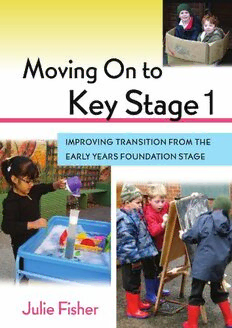
Moving On to Key Stage 1: Improving Transition from the Early Years Foundation Stage PDF
227 Pages·23.83 MB·English
Most books are stored in the elastic cloud where traffic is expensive. For this reason, we have a limit on daily download.
Preview Moving On to Key Stage 1: Improving Transition from the Early Years Foundation Stage
Description:
This timely book will help teachers in KS1 to implement authoritative recommendations on transition from recent reviews of primary education, and convince senior managers and parents of the value of starting from the child. Its well-grounded arguments coupled with practical guidance will foster the development of principled and confident professional judgement. Wendy Scott, President, TACTYC "Julie is an excellent writer, leading her reader through the difficult arguments about what really matters in our work with young children. She explores the tensions around the different 'drivers' in Foundation Stage and Key Stage One teaching with sensitivity but with the same clear vision she shows in her earlier books. This is an important book for students, lecturers and teachers - and a must for heads and subject co-ordinators." Nick Swarbrick, Westminster Institute of Education, Oxford Brookes University, UK "Your common-sense, authoritative, warm and inspirational words...remind me beyond all doubt of why I went into teaching." Key Stage 1 teacher "Julie Fisher's newest contribution to the debate on transitions in England is written in her usual clear and accessible style, and with the breadth and confidence which all readers have come to expect of her." Liz Brooker, Institute of Education, University of London, UK This practical book offers a series of strategies for promoting learning that meets the needs and interests of Key Stage 1 pupils, ensuring that the move from the Early Years Foundation Stage to Key Stage 1 is a positive one. It includes: Descriptions and case studies of good practice that stem from established principles of learning and teaching Reflective practice prompts at the end of each chapter Julie Fisher considers recent evidence about how children learn and questions whether current practice in Key Stage 1 optimises these ways of learning. Challenging the reliance on teacher-directed activity, she asks whether introducing more child-initiated learning could offer children a more appropriate balance of learning opportunities. Key issues include: The place of play in Key Stage 1 Organising the learning day to include child-initiated activity Observation and assessment Planning The role of the teacher This essential book is indispensable reading for students and practitioners in both the Early Years Foundation Stage and Key Stage 1.
See more
The list of books you might like
Most books are stored in the elastic cloud where traffic is expensive. For this reason, we have a limit on daily download.
